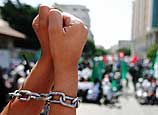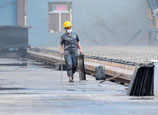
JERUSALEM, July 16 (Xinhua) -- Although Egypt is undergoing political tremor, the cooperation between Egyptian military and its Israeli counterpart remains stable, with both sides interested in maintaining the 1979 peace treaty.
Analysts told Xinhua that there is a high level of trust and coordination between Israeli and Egyptian armies, with the threat of terror attacks by Sinai-based groups a major concern for both countries.
SHARED SECURITY INTERESTS
On Monday, Israeli Defense Minister Moshe Ya'alon approved an Egyptian request to deploy two additional infantry brigades in the Sinai Peninsula.
Since the ouster of Egyptian President Mohammed Morsi two weeks ago, there has been a number of attacks on Egyptian military and civilian targets in Sinai, as well on Israeli forces patrolling the border.
The two new brigades will be part of Egypt's accelerated effects to bring peace and order to Sinai, the Israeli news-site Times of Israel reported.
When Egypt and Israel signed the peace treaty in 1979, Israel agreed to return Sinai to Egypt on condition that the peninsula would become a demilitarized zone, and the two sides settled that any alterations to the number of units stationed there would require the other side's approval.
"The Egyptian problem is also an Israeli problem, so there is a common interest to stop those terror and Jihadist organization, especially in northern Sinai," Moshe Marzuk, researcher at the Institute for Counter-Terrorism at the Interdisciplinary-Center in Herzliya, told Xinhua on Tuesday.
He added the Israeli army trusts the Egyptian army and that " there is a good tactical relationship between the officers on both sides."
NO INTENTION TO INTERVENE
Prof. Shlomo Aronson, of The Hebrew University of Jerusalem, said that Israel doesn't want to intervene in Egypt's domestic affairs.
"What happened to Morsi inside Egypt is not our business," he said.
While Israel has reservations regarding Egypt's Muslim Brotherhood, Israel also has a "troubled" history with several leading opposition figures in Egypt, such as new Vice President Mohamed ElBaradei, who previously served as the head of the International Atomic Energy Agency (IAEA), the United Nation's organization in charge of monitoring nuclear programs.
Israel has accused ElBaradei of being "too soft" on the Iranian nuclear issue.
















 College student car models show youthful vigor
College student car models show youthful vigor


![]()
